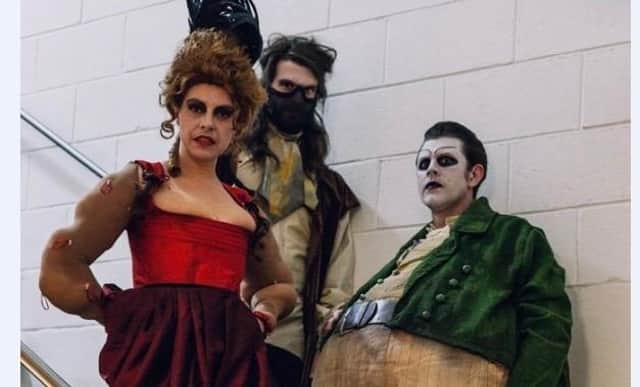Al Seed interview: Tragedian and comedian, the Fooligan is back again


For fans of theatre, the internet during lockdown has become a strange and sometimes startling place, full of echoes of the artform currently lost to us; and those searching for signs of life from Scottish theatre might just, this week, have come across an extraordinary, small, rich pearl, dropped quietly from the hand of one of the country’s most remarkable solo performers.
Al Seed’s name is not famous; a professional life spent exploring the radical outer edges of solo performance rarely leads to fame and riches, although Seed shows ranging from Fringe First winner Raw Beef in the early 2000s, to more recent shows including The Factory, The Fooligan and the Total Theatre award-winning Oog, have won international acclaim.
Advertisement
Hide AdIn Seed’s work, it is the figure of The Fooligan that recurs most often – a grotesquely swollen, wealthy buffoon, both malign and ridiculous; and it is The Fooligan who is the central figure in Seed’s new three-minute film, The Sick Rose, which appeared on the internet last week.
In The Sick Rose, though, The Fooligan is not alone. The film also features Seed’s new band The Bridges of Madness, made up of musicians David Paul Jones, Emma Smith, and Davide L Rinaldi; and it offers an extraordinarily lush and decadent three minutes of sound and imagery, recorded in the dramatically-lit baroque surroundings of the Savings Bank venue on Glasgow’s Bridge Street. The story is of a poisoning; and the music is a dark and growling setting of William Blake’s poem “The Sick Rose” that signals the band’s plan to create a musical and visual adaptation of all of Blake’s Songs of Innocence and Experience, for sharing on digital platforms.
“The odd thing about this whole project,” says Seed, “is that it actually predates the Covid crisis. I’ve been working extremely hard over the last few years, I’ve got two young children who are with me part of every week, and I was planning and fundraising for a whole series of future tours, including one this spring; and over Christmas, I just experienced a kind of total burnout. Creative Scotland were very understanding, and let me switch the support for the William Blake project to an idea for digital presentation; so the when the crisis hit, I was already there, and most of the work on the Sick Rose film had already been done. Now I want to use it as a way of trying to build audiences online; and it’s also been great working with the musicians, and exploring ways that we can use digital networks for distributing music to find an audience for this piece.”
None of which means that lockdown is entirely easy for Seed. Live performance has been the touchstone of his work ever since he emerged from an early childhood in Kenya, Tanzania and Qatar – his father was a civil engineer – to discover his need for “freedom through creativity.” As a teenager, and later as a theatre and film student at Glasgow University, he found himself drawn to the music of the Velvet Underground, and through them, to other radical counter-culture figures like Blake, Baudelaire and William Burroughs; he wrote poetry and film scripts, and began to understand the subversive quality of a true, hedonistic pleasure principle in a driven society like ours.
It was some time in the late 1990s, though, that Seed had an encounter with the globally acclaimed clown show Slava’s Snow Show, and began to realise that the text-based notion of theatre and performance he had previously taken for granted was not the whole story, or even the best part of it; and within a few years, he found himself training in circus skills at Circomedia in Bristol.
“It wasn’t that I wanted to do circus,” says Seed, “but I needed that grounding in physical performance, in how to move and balance and co-ordinate. The more I learned about clowning, the more I realised that it was the buffon-figure, the malign, dark side of foolishness, that really interested me; and then I was lucky enough get funding, and support from venues like The Arches in Glasgow, that helped me to develop that.”
Advertisement
Hide AdSince then, Seed’s career on the wilder shores of performance has rarely looked back, although it involves living as an artist without any permanent income – and under constant pressure to make successful applications for project funding – while also navigating the “gig” economy in arts mentoring and advice; Seed says that at the moment, he can barely imagine making any of his possible projects fit the lengthy new application form for Creative Scotland’s Supporting Creative Development fund, which has just replaced its previous pots of project funding.
For all that, though, Seed sees himself as being in a privileged position, particularly in having resources available for a digital project at the moment. “I think I’m lucky to be able to treat this time, in some ways, as an unexpected sabbatical,” he says. “I think a lot of us had got caught up in a terrible hamster wheel of work and administration; and this is a chance to undo that a bit, to regain perspective, read, look at trees, even bring some old ideas out of the bottom drawer. I’ve also realised that this is the first time I’ve played with my children with real commitment for years, without simultaneously doing budgets in the back of my head. That’s such a pleasure; and if it is a bit subversive of our world as it was before the crisis – well, maybe that will be one of the best things to come out of all this, when the world starts to open up again.”
The Sick Rose is available at https://www.facebook.com/AlSeedProductions/